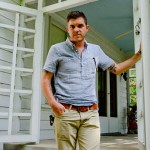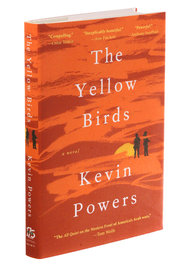I read this novel twice, the two readings within a few days of each other.
Rarely do I read a book twice, tho I’m beginning to rethink that and already know the book I’m going to read again soon (Tanya Chernov’s This Emotional Girl. See earlier review).
The Yellow Birds is the first novel of Kevin Powers,  who as a 17 year old (?) joined the US Army and then served in Iraq in 2004/5. His novel takes place over a time period of about five years, from before the main character deploys to Iraq to the three or four years after he returns to Virginia, where he was born.
who as a 17 year old (?) joined the US Army and then served in Iraq in 2004/5. His novel takes place over a time period of about five years, from before the main character deploys to Iraq to the three or four years after he returns to Virginia, where he was born.
The novel has already been compared to, or put into the same category as, Stephen Crane’s The Red Badge of Courage, Erich Maria Remarque’s All Quiet on the Western Front, Norman Mailer’s The Naked and the Dead, and Tim O’Brien’s The Things They Carried & Going After Cacciato.
Those comparisons probably are what led to my interest in the book and to my first reading. It is a short book, just 225 pages and takes just a few hours to read. The story focuses primarily on three characters who are deployed to Al Tafar, Iraq. The main character, Private John Bartle, 21 years old, serves as Powers’ focus for his story and his descriptions of the war and its aftermath. Two other characters, Private Daniel Murphy, 18, and a veteran sergeant _____Sterling, 24, are secondary characters, but important ones.
The Yellow Birds then is the story of these three young soldiers’ experiences over a one to two year period and their attempts to stay alive. I’ll avoid ’spoilers’ and not take away your own discoveries if you choose to read it yourself.
My first reading largely focused on the time period Bartle, Murphy, and Sterling were in Iraq. My second reading focused more on what the effect of the war once there was a return home. These two time period are interwoven in the novel.
Both narratives are important for this particular story and for Powers’ purpose(s) in writing about Iraq.
I suspect most wars are at once the same and yet different. There are elements in The Yellow Bird that echo some of the earlier classic war novels. There are also some new elements in this one.
Powers, according to the jacket on the book, “graduated from Virginia Commonwealth University and holds an MFA from the University of Texas at Austin where he was a Michener Fellow in Poetry.” He is now just 31.
A poet he is.
And more.
It’s almost disconcerting to have such wonderful ‘poetry’/prose used to describe what takes place in war and after war. Powers is not the first nor will he be the last to try to describe what war is like from the point of view of the soldiers who fight a war or to try to convey the ‘cost(s) of war, especially to those individuals who have fought it. For me, those who compare this novel with some of the earlier classic works are accurate.
What I seem to have missed in the first reading and what I think makes The Yellow Birds a book especially worthy of consideration is his descriptions of what the war means to the particular individual once the war is over. Again, he’s not the only writer to do this, but he describes one survivor’s ‘after-war’ life in such a way that for me he breaks some new ground. Or, at least, puts a face and feelings to why some veterans have such a difficult time even tho they have managed to survive the war itself.
I don’t know if The Yellow Birds will stay with me as long as Dalton Trumbo’s Johnny Got His Gun has, but it certainly is in the category of the Karl Malantes’ recent Vietnam novel Matterhorn and others to which it is being compared. Kevin Powers has written a powerful first novel and one I believe deserves to be widely read.


